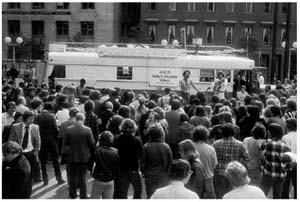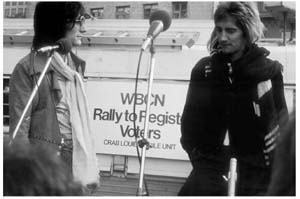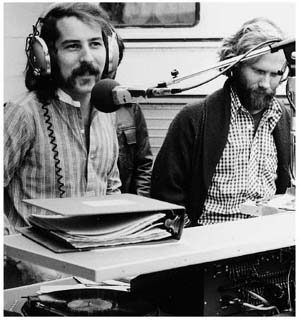Radio Free Boston (14 page)
Authors: Carter Alan

Meanwhile, some others were on their way out, with a bang in Michael Fremer's case. On the air as a weekend announcer mixing comedy and music, he soon ran afoul of the feminists. “I used to joke about Marsha Steinberg, âJamaica Plain Jane,' who worked in the news section with Andrew Kopkind. I called her âJamaica Lame Brain.'” For International Women's Day on 8 March 1974,
WBCN
planned a twenty-four-hour cycle of special women's programs and music ending at midnight, which happened to be the beginning of Fremer's weekend show. At the stroke of twelve, he launched into his introduction: “Welcome to the âMen's Room!' Tonight we're going to play men's music: like Herbie Mann and Manfred Mann, the Johnny Mann Singers . . .
Man
drake Memorial! We're going to have the âShaving Hotline' where you can call and get grooming tips and learn how to grow that funny little thing that Gregg Allman has under his lip! We've got a list of words that are not acceptable, like menopause and mandate.” Fremer went on and on for “ten minutes of silliness.” The feminists were not amused, raising enough of a fuss that Norm Winer had to fire the comedian. Fremer had
man
aged to
man
euver himself permanently off the air as a
DJ
at
WBCN
.
The
Boston Globe
reported in 1973 that '
BCN
produced “an ambitious array” of public affairs programs, including “ âCommunity Report,' âThird World Report,' âSchool Daze,' and âLockup,' the reigning favorite at Boston area prisons.” Listeners behind bars tuned in to hear their requests as well as self-help information for them and their families. âLockup' had been in production for a couple of years by that point, and Al Perry remembered an encounter from 1971 regarding the show. “We needed to raise money to buy radios for the prisoners who didn't have them. A lot of guys were writing in, saying, âI've got to listen to a guy's radio three cells down.' Frank
Zappa's â200 Motels' was coming out and Frank was doing a movie tour. I guess because I lived close by, they said, âAl, you got to get Frank; Maxanne's going to do an interview with him. He's at the Elliot Hotel; pick him up and bring him to the station. Then you can talk to him about helping [us to raise money].'” The assignment was not necessarily an easy one.

Rockin' at the Government Center with Jonathan Richman.
WBCN
voter registration rally in front of Sam Kopper's Crab Louie broadcast bus. Photo by Sam Kopper.

Ron Wood and Rod Stewart of the
Faces
bring star power to the voter registration rally. Photo by Sam Kopper.
I'd met him before and Frank could be touch and go. But he finished the interview, we got in the cab, and we're going back to the hotel and I say, “Frank, I've got a favor to ask.”
He says, “Yeah? What?”
“The owner of the theater [where the Boston premier of â200 Motels' was scheduled] is a friend of ours, and we have this prisoner request show . . .”
“Really?”
So, I told him about the show, then, “We'd like to buy some radios with all the ticket sales at the premier.” Frank was a straight-shooter. Right away, he looks at me and says, “No problem.” Writes on a piece of paper, “Here's who to call.” And that was it.
Then there was “The Lavender Hour.” John Scagliotti tells the story of that groundbreaking gay-oriented show.
Sunday night, ratings-wise, was quiet, and we in the news department wanted to be
DJS
once in awhile, too. So, we convinced Al Perry to let us do a thing in the ten o'clock hour called “Pot Luck.” You could do anything, it didn't matter, and anyone could do one of these shows. Eventually, Andy [Kopkind] and I just took it over and we changed the name to “The Lavender Hour.” It allowed us to play music, but then we started to add things, like John Wieners doing these gay poems. When David Bowie came to town, I went out to the press conference with a tape recorder and asked him why he wouldn't come out! [Bowie had told the English press that he was bisexual, admitting years later that it was just a publicity stunt.] I had a big fight with him, which I taped and then put on the air.
Scagliotti laughs at the memory.
Danny Schechter quickly welcomed and sanctioned what he called the “innovative gay cultural magazine” as part of the station's public affairs schedule. Scagliotti clarified,
It wasn't like a gay documentary; it was just music, poetry, and once in a while an actuality or a sound bite. But it turned out to be the first time a gay program was on commercial radio. We got to play disco music which nobody would play on
WBCN
. Can you imagine '
BCN
playing Donna Summer? I started getting letters from kids way up in New Hampshire and Western Massachusetts. One sixteen-year-old said that he had thought of committing suicide because he was gay, but would sneak up to his bedroom and listen as quietly as he could to “The Lavender Hour” and it helped him through his crisis. It never occurred to me that we had gone from just having a good time to being important to people.
In 1972, the station was the most open place around; you could be gay and be loved and cared for and allowed to work. You could do anything you wanted to, to the point where I was real spoiled. I had a hard time working in other places after that.
“Very few stations inspired that kind of loyalty, commitment, and devotion to the art of it and also the audience,” Danny Schechter observed. “This was beyond the rock and roll and the format; you were part of something, and it made going to work something you looked forward to doing. We really felt it was
our
radio station and we were acting, in a broader way, for the entire community.”
If
WBCN
was a big fractious family at the dinner table, someone still had to bring the roast out, say grace, put out fires (in the oven
or
at the table), deal with the owners of the house and reset the smoke detectors. That person was Norm Winer, who as program director realized that if he ever wanted to do a normal air shift like the others, he'd need to develop an alter ego. “I decided I needed a different identity so people wouldn't apply for jobs or critique the station when I was on the air. I became Old Saxophone Joe. I stole that name from Bob Dylan's song âCountry Pie,' but I tried to convince people when I met them that he wrote the song about me!” Truly, Winer was a laid-back music junkie, just wanting to be left free to enjoy his radio show, unshackled from the responsibility of the office while on the air. To some extent he succeeded in segregating his roles, but any time, day or night, the program director might be thrust into the role of cop or peacemaker. The constant parrying with Hastings; the episodes with Vaprin and Fremer; the need to address new trends in music; and increasing pressure from sales to relax the standards that the air staff had
imposed on both the type and style of commercials allowed made him less '
BCN'S
communal shaman and more an official administrator. “I believed that unless I assumed this responsibility, no one else would, because none of us wanted responsibility.”

WBCN'S
Norm Winer as Old Saxophone Joe, with Sam Kopper. Photo by Don Sanford.
John B. Wood at the
Boston Globe
wrote an article in May 1973 about the station's appeal and, at the time, the impending move to the Prudential Tower just a month hence. Entitled “
WBCN
: Somewhere between Artistic Freedom and Anarchy,” the piece detailed the “creative chaos” that the station's twenty-three employees experienced daily while running the successful radio outlet and maintaining its hip attitude, “on the edge” music choices, and cool restraint. But Wood isolated
WBCN'S
advertising policy as “one bone of contention” and described it as “an unfortunate corollary to
its success.” The article continued, “In its idealistic early days, the station rejected any ad that was inconsistent with its programming or its scruples. Those days are gone. Today,
WBCN
takes any advertising it can get. National advertising, which accounted for less than $100,000 last year, is expected to make up half of
BCN'S
$800,000 billing this year.” The article mentioned Winer himself, on the air as Old Saxophone Joe, lamenting that he had to play a taped ad “extolling the praises of Exxon gasoline.”
WBCN
had made a commercial shift in its thinking, but the process was gradual and marked by pitched battles back and forth. Tim Montgomery, then sales manager, observed, “Norm was always really laid-back and soft-spoken, logical. [But] we had a lot of arguments over the advertising because I was always trying to wedge spots on the air. I tried to force the issue because we did have budgets to make; T. Mitchell always saying, âI got to make the payroll.' So, there was that tension.”
“I remember the list of unacceptable advertising that we had, in Charles's handwriting, actually,” recalled Winer. “Dow Chemical, who made napalm for the U.S. Army was on that list. We didn't have to run all of that because we were lucky we had a booming advertising base with all of Don Law's clubs and concert halls, the head shops and waterbed stores. I remember thinking back in the early seventies, âIf it wasn't for waterbed stores, '
BCN
would have gone under a long time ago!'”
The decision as to whether an ad was acceptable, even if it made it through the Winer/Montgomery negotiation process, could often be personal and emotional. The best example involved, who else, but Charles Laquidara, one morning on “The Big Mattress.” “You have to remember the context,” Montgomery explained as he recounted the story. “The Vietnam War was still raging; it was unpopular, and you did anything you could to stay out of it. People my age had either moved to Canada, dodged the draft, or become a Peace Corps volunteer like me.” Montgomery worked for Vista, the domestic version of the Peace Corps, gaining a selective service deferment before working at
WBCN
. “One of my big accounts was a store called Underground Camera. I was driving into work one day, Charles was on, and he started reading one of my ads.” Norm Winer, already in his office, recalled that “Charles was doing a live sixty-second read about âHoneywell-Pentax Week,' the big discount sale at Underground Camera in Cambridge.” Tim Montgomery resumed the story: “I'm tooling along in my car, kind of not paying too much attention, and he does the spot pretty
straight. Then he pauses and says, âWell, that's fine if you want to support a company that's responsible for killing babies in Cambodia.' What!? I had a hard time keeping my grip on the steering wheel after that!”
Danny Schechter attributed Laquidara's ad-lib to a report the News Dissector had read regarding Honeywell's production of antipersonnel weapons for the U.S. Defense Department, including the deadly cluster bomb known as the “Lazy Dog.” These bombs didn't explode themselves but scattered hundreds of round canisters, each with its own delay fuse, over the landscape. Later, these bomblets would release hundreds of deadly projectiles, either ball bearings or steel darts, indiscriminately through hapless soldiers or innocent civilians after the people had emerged from hiding. Honeywell's association with Pentax Cameras and, in turn, the local retailer, created a set of advertising bedfellows that Laquidara castigated in one quick coda. “Before Charles was even off the air, the general manager had marched down to my office; the client had already called and the salesperson was in there,” Norm Winer said. “I told them, âI'll take care of it!' So, very quietly, I congratulated Charles on doing a great thing, then publicly suspended him with pay till it blew over. We could tell the client, âWe disciplined him; he's off the air.' But the reality was that Charles did the right thing. That was part of the romance of '
BCN
: doing the right thing.” There wasn't much Tim Montgomery could do: “That was the end of the account,” he moaned, “plus, they sued '
BCN
.”
